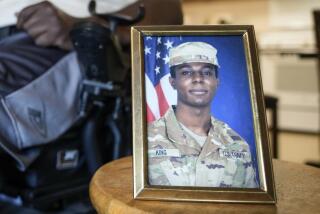Soldier Faces Desertion Charge
- Share via
SAVANNAH, Ga. — The Army has brought charges against a soldier who refused to return to Iraq for a second combat tour because he now objected to war, officials said Thursday.
Sgt. Kevin Benderman notified his commanders Dec. 28 that he was seeking a discharge as a conscientious objector. He refused orders to deploy with his unit Jan. 8 while the Army processed his objector claim.
Benderman was charged with desertion and a second count that accused him of intentionally skipping his deployment flight.
“My response to those charges is not guilty,” said Benderman, 40. “I am prepared to deal with whatever consequences my action brings.”
Benderman, an Army mechanic with 10 years in the military, spent eight months in Iraq in 2003 with the 4th Infantry Division from Ft. Hood, Texas. He transferred to Ft. Stewart after returning from the war.
Though he never fired a gun in combat, Benderman said the misery he saw firsthand -- including a badly burned young girl and mass graves filled with men, women and children -- led him to seek objector status.
Ft. Stewart commanders contend Benderman still had an obligation to deploy with his unit while they considered his conscientious objector application.
“The people that it hurts the most are those people who are a close-knit part of his team,” Maj. Gen. William G. Webster, the 3rd Infantry commander, told reporters Thursday. “But if you talk to these soldiers here, it’s sort of below the noise level.”
Army investigators must now decide whether to prosecute Benderman in a court-martial or allow his case to be handled administratively, said Lt. Col. Robert Whetstone, a Ft. Stewart spokesman.
If convicted by a court-martial, Benderman faces up to seven years in a military prison, reduction in rank and a dishonorable discharge, Whetstone said. Military courts can also opt for no punishment, even for defendants found guilty.
Benderman has since been assigned to a rear-detachment unit with no restrictions. He said he had been granted two weeks of leave that he would use to prepare his case.
“We’re still going to treat him with honor and respect,” Whetstone said. “He’s a soldier, he’s wearing the uniform and he’s a veteran. But when regulations are broken and orders are disobeyed, we’ve got to do what we’ve got to do.”
More to Read
Sign up for Essential California
The most important California stories and recommendations in your inbox every morning.
You may occasionally receive promotional content from the Los Angeles Times.












